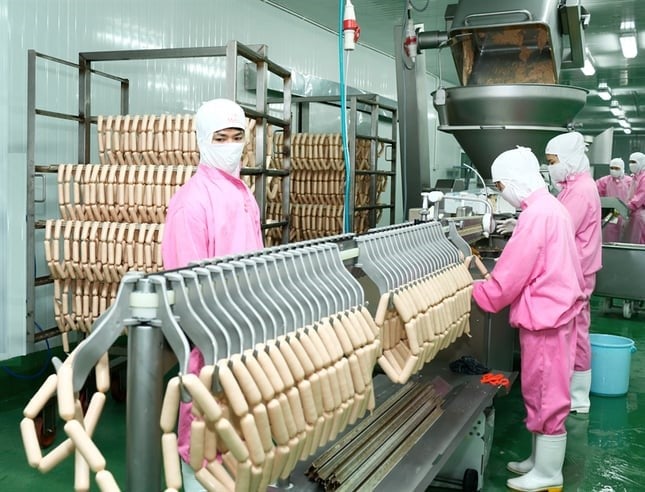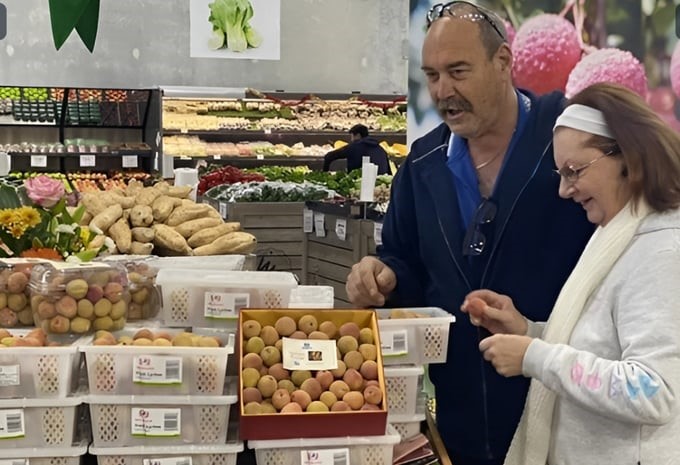May 18, 2025 | 06:26 GMT +7
May 18, 2025 | 06:26 GMT +7
Hotline: 0913.378.918
May 18, 2025 | 06:26 GMT +7
Hotline: 0913.378.918

Mavin's products are produced in a closed chain "from farm to table" in Vietnam.
Vietnam is identified as an important economic partner for Australia. Both countries aim to double their two-way investment and become each other's leading trading partners. Since the two countries built their strategic partnership in 2018, the cooperative relationship has entered a new, more comprehensive, and more substantial phase and achieved a number of outstanding achievements.
Data from the Australian Consulate-General in Ho Chi Minh City shows that as of September 2023, Australian investors have 593 investment projects in Vietnam, with a total registered capital of approximately USD 2 billion. These projects focus on the fields of industrial processing, manufacturing, accommodation and food services, agriculture, forestry, and fishery.
Recently, Australian businesses have been investing in Vietnam in the fields of resources and energy, with a focus on renewable energy, electric vehicle batteries, and energy storage solutions.
Present in the Vietnamese market since 2004, Mavin Group is one of the foreign businesses operating effectively in the agriculture sector in Vietnam. Currently, Mavin has expanded with five large-scale and modern animal feed processing factories and one food processing factory. Mavin's business system has 2,600 employees, and products are present throughout the country.
Mavin determines that Vietnam is a market with good growth potential and an investment environment with many preferences, low production costs, a strategic location, and a strong digital economy.

Vietnamese agricultural products are present more and more at Australian supermarkets.
Expanding the investment market in Vietnam since 2006, Linfox is also an Australian logistics enterprise that always aims to invest professionally and give prominence to sustainable development. Linfox has invested in stages of the supply chain, such as modern warehouses in Bac Ninh, the construction of large-scale distribution centers stretching from Bac Ninh, Quang Binh, Da Nang, and Binh Duong to Cu Chi, and the formation of a cross-border transportation network to Laos.
Besides, many Australian companies have also invested in Vietnam, including Telstra, RMIT, ANZ, Bluescope Steel, Allens, BHP, Austal, VMS, and Midway Metals in the manufacturing field; Blackstone Minerals and Blueleaf Energy in the natural resources and renewable energy field; and CBH and SunRice in the agriculture field. These strategic investments contribute to developing Vietnam's infrastructure and economy.
In addition to welcoming Australian businesses to continue researching and expanding investment in Vietnam, Vietnam also expects that there will be more of Vietnam’s business & investment projects and brands appearing in Australia in the upcoming time.
In the opposite direction, in Australia, there are 93 investment projects by Vietnamese businesses with a total capital of about USD 586 million, ranking 11th out of 80 countries and territories where Vietnam invests abroad. Vietnam’s businesses that have recently invested in Australia include TH Group, Hoa Phat Group, TTC AgriS, and Vitadairy.
Along with the investment sector, as one of Vietnam's major trading partners, the scale of bilateral trade between Australia and Vietnam in recent years has continued to increase strongly thanks to the exploitation of multilateral trade agreements.
By the end of 2023, this number had reached nearly USD 14 billion, down 12% compared to 2022. Of which, Vietnam's export turnover to Australia reached USD 5.2 billion, down 5.3% over the same period in 2022.
In reverse, Vietnam's import turnover from Australia reached USD 8.5 billion, down 15.7% over the same period in 2022. Vietnam's trade deficit from Australia is worth USD 3.3 billion, down 28.1% over the same period in 2022.
According to data from the Vietnam Trade Office in Australia synthesized from statistics of the General Department of Vietnam Customs, the total trade turnover of goods between Vietnam and Australia in January 2024 reached USD 1.25 billion, an increase of 43.4% over the same period in 2023 (USD 872 million) and an increase of 10.6% compared to December 2023 (USD 1.13 billion).
Vietnamese products exported to Australia are relatively diverse. Of which, the products of phones and phone components, machinery, electronic components, computers, crude oil, textiles, footwear, and seafood account for the largest proportion.
Particularly in January 2024, many products that are Vietnam's strengths, such as coffee, iron and steel of all kinds, paper, and products from paper and rice, have grown strongly, although their export turnover to Australia is still modest.
Vietnam and Australia enjoy a good traditional relationship that is developing strongly in many fields. In particular, trade and investment relations are one of the main pillars. Vietnam-Australia economic cooperation is mutually complementary and has much fiscal space for development in the future.
At the invitation of Prime Minister Anthony Albanese, Prime Minister Pham Minh Chinh and his wife will officially visit Australia and attend the Special Summit commemorating 50 years of ASEAN-Australia relations in Melbourne from March 4–9.
The visit of Prime Minister Pham Minh Chinh has special significance, helping to create new momentum for Vietnam-Australia bilateral relations while contributing to promoting the ASEAN-Australia Comprehensive Strategic Partnership. This event will contribute to the effective implementation of the 13th Party Congress's foreign policy focusing on developing relations with the region.
Translated by Huyen Vu Thu

(VAN) Minister of Agriculture and Environment Do Duc Duy held a meeting with Soopakij Chearavanont, Chairman of C.P. Group, on May 15.
/2025/05/16/3800-0-nongnghiep-143756.jpg)
(VAN) Suntory PepsiCo Vietnam coordinated with the Ministry of Education and Training to implement an education program on water conservation, reaching nearly 1 million primary school students nationwide.

(VAN) Vietnam’s TH Group officially put its high-tech fresh milk processing plant into operation in the Russian Federation, marking a historic moment as the first TH true MILK cartons were produced in Russia.

(VAN) Use of high-quality broodstock and biotechnology is regarded as the most effective approach to ensuring sustainable and economically viable shrimp aquaculture ahead of climate change and the emergence of increasingly intricate disease patterns.

(VAN) Carbon farming is a form of agricultural practices that helps absorb more greenhouse gases than it emits, through smart management of soil, crops, and livestock.

(VAN) This is a key content of the Memorandum of Understanding recently signed between the Vietnam Fisheries Society and Kunihiro Inc of Japan.

(VAN) To achieve the goal, local authorities and businesses in Kon Tum province have fully prepared the necessary conditions for the new Ngoc Linh ginseng planting season.